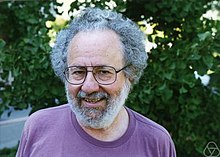Martin Davis
Martin Davis (* 1928 in New York City ) is one of the most important living logicians and theoretical computer scientists .
Life
Davis was born in New York City in 1928 to Polish immigrants .
He first studied mathematics at the City College of New York . During this time his development was strongly influenced by Emil Leon Post . In 1950 he received his PhD from Alonzo Church at Princeton University . He then worked for a year at the University of Illinois at Urbana-Champaign as a research instructor. He then worked as a programmer for the ORDVAC computer at the University of Illinois, which was completed in 1951 . During this time he wrote the first version of his 1958 book Computability and Unsolvability , which is one of the classics of theoretical computer science.
From 1952 to 1954 he was a guest at the Institute for Advanced Study in Princeton . After various positions, including at the University of California, Davis , the Bell Telephone Laboratories and for the RAND Corporation , he went to New York University as a professor in 1965 . From 1969 he built up the Department of Computer Science there. After 31 years at the university, he retired in 1996, which he spent in Berkeley with his wife Virginia .
Services
Famous Martin Davis was mainly due to the 1961 together with Hilary Putnam and Julia Robinson published work The decision problem-for exponential Diophantine equations that the foundations for resolving David Hilbert's tenth problem by Yuri Matijassewitsch delivered. The Davis-Putnam method and the Davis-Putnam-Logemann-Loveland algorithm ( DPLL ) are also important.
Honors
Martin Davis received the Lester Randolph Ford Award in 1974 and the Chauvenet Prize of the Mathematical Association of America in 1975 . The American Mathematical Society honored him with the Leroy P. Steele Prize in 1975 . In 2005 he was awarded the Herbrand Award . In 1962 he gave a lecture at the International Congress of Mathematicians in Stockholm ( Quantification theory as a free variable calculus ). He is a fellow of the American Mathematical Society.
Publications
- Computability, Complexity, and Languages: Fundamentals of Theoretical Computer Science . 2nd Edition. Academic Pr Inc, 1994, ISBN 0-12-206382-1 (English).
- Solvability, Provability, Definability: The Collected Works of Emil L. Post (Contemporary Neuroscientists) . Birkhäuser, Boston 1993, ISBN 0-8176-3579-3 (English).
- Engines of Logic: Mathematicians & the Origin of the Computer: Mathematicians and the Origin of the Computer . Reprint edition. WW Norton & Co, 2001, ISBN 0-393-32229-7 (English).
- Arithmetical Problems and Recursively Enumerable Predicates . In: The Journal of Symbolic Logic . Reprint edition. Vol. 18, No. 1. WW Norton & Co, March 1953, p. 33-41 (English).
- The decision problem for exponential diophantine equations . In: Ann. of Math. Vol. 2, No. 74, 1961, ISSN 0003-486X , pp. 425-436 (English).
Individual evidence
- ↑ Annals of Mathematics (2) 74 (1961) 425-436
- ↑ for Hilbert's tenth problem is unsolvable , American Mathematical Monthly, Volume 80, 1973, p. 233
Web links
- Interview with Martin Davis (English; PDF; 32.58 MB)
- Martin Davis in the Mathematics Genealogy Project (English)
- Martin Davis at New York University
| personal data | |
|---|---|
| SURNAME | Davis, Martin |
| BRIEF DESCRIPTION | American logician |
| DATE OF BIRTH | 1928 |
| PLACE OF BIRTH | new York |
